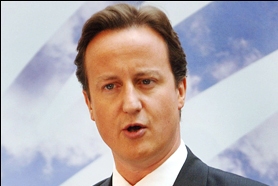Tories ‘will rip up red tape to make UK digital leader’
Conservatives’ manifesto outlines commitments to start-ups and science skills

The Conservatives will rip up 10 billion of red tape to help SMBs and start-ups make Britain Europe's leading technology hub if the party wins a second term in power.
SMBs and start-ups
The party released its election manifesto today, promising to make the UK the best place to do business in Europe by 2020 by cutting through unnecessary bureaucracy though details of what comprises that red tape were scarce.
It will also triple its Start Up Loans programme to lend cash to 75,000 enterpreneurs hoping to start their own businesses.
These measures come after the Tories, in the current coalition government, helped small businesses by upping the Annual Investment Allowance to 500,000 though it's due to drop to 25,000 in January 2016.
Claims over late payments, which can be especially damaging to SMBs, may be mediated by a Small Business Conciliation service under a Tory government.
R&D
Get the ITPro daily newsletter
Sign up today and you will receive a free copy of our Future Focus 2025 report - the leading guidance on AI, cybersecurity and other IT challenges as per 700+ senior executives
The UK would become Europe's leading beacon in modern technology under a Conservative government, the party claimed, thanks to 2.9 billion investment in R&D.
That cash would be funnelled into a Grand Challenges Fund to spend on research facilities like the new Big Data lab in King's Cross, the 42 million Alan Turing Institute.
The manifesto added: "We have boosted research and development tax credits and we will continue to support our network of University Enterprise Zones, ensuring that Britain's world-beating universities are able to make money from the technology they develop."
Another research area getting focus from the Tories is driverless car technology.
Four projects around England have already got 19 million in funding from the coalition government to trial self-driving cars, and the Department for Transport (DfT) has approved real-world testing.
If the Tories are re-elected, they plan to work with the Automotive Council to bolster the burgeoning technology, as well as splashing cash on robotics and nanotechnology.
Digital skills and training
Addressing the tech skills gap has been a priority for some time, with the coalition spending 20 million on IT degree apprenticeships in an attempt to plug it.
It's also introduced a new computer curriculum for schools and in addition, the Conservatives want to train another 17,500 maths and physics teachers in the next five years.
Broadband and 5G
David Cameron's party again underlined its commitment to bring superfast broadband to 95 per cent of the population by the end of 2017.
So far two million UK homes or offices are connected, and 40,000 are being upgraded each week, it claimed.
The 790 million pound roll out is in the hands of BT, which has aired doubts over whether it will meet the deadline, however.
Labour yesterday said all of the UK would have superfast broadband by 2020 in its own manifesto.
But the party's efforts in the coalition government saw mobile operators agree to end mobile not-spots' by coughing up cash to ensure 90 per cent of the UK will have voice and text coverage by 2017.
The manifesto read: "We will hold the mobile operators to their new legally binding agreement."
It added: "We will ensure that Britain seizes the chance to be a world leader in the development of 5G, playing a key role in defining industry standards."
Digital government and public services
Under the coalition government, large legacy IT contracts are being phased out in favour of using smaller suppliers through frameworks like the G-Cloud.
While doubts were aired over the Cabinet Office hitting its target to spend 25 per cent of its procurement budget with SMBs a year early, the Tories would up that target to one-third in a second term.
Whitehall introduced the Government Digital Service (GDS), a large team driving departments to become digital while also transforming IT and public services.
Initiatives like Gov.uk have seen all government websites move to one platform, while Government-as-a-Platform (GaaP) would create common components departments can re-use for different services, cutting down on outsourcing and waste.
"We have already created 20 high-quality digital services, which include apprenticeships applications and tax self-assessments," read the manifesto.
"We will save you time, hassle and money by moving more services online, while actively tackling digital exclusion.
"We will ensure digital assistance is always available for those who are not online, while rolling out cross-government technology platforms to cut costs and improve productivity such as Gov.uk."
Labour published its own election manifesto yesterday.
-
 Bigger salaries, more burnout: Is the CISO role in crisis?
Bigger salaries, more burnout: Is the CISO role in crisis?In-depth CISOs are more stressed than ever before – but why is this and what can be done?
By Kate O'Flaherty Published
-
 Cheap cyber crime kits can be bought on the dark web for less than $25
Cheap cyber crime kits can be bought on the dark web for less than $25News Research from NordVPN shows phishing kits are now widely available on the dark web and via messaging apps like Telegram, and are often selling for less than $25.
By Emma Woollacott Published
-
 Starmer bets big on AI to unlock public sector savings
Starmer bets big on AI to unlock public sector savingsNews AI adoption could be a major boon for the UK and save taxpayers billions, according to prime minister Keir Starmer.
By George Fitzmaurice Published
-
 UK government targets ‘startup’ mindset in AI funding overhaul
UK government targets ‘startup’ mindset in AI funding overhaulNews Public sector AI funding will be overhauled in the UK in a bid to simplify processes and push more projects into development.
By George Fitzmaurice Published
-
 UK government signs up Anthropic to improve public services
UK government signs up Anthropic to improve public servicesNews The UK government has signed a memorandum of understanding with Anthropic to explore how the company's Claude AI assistant could be used to improve access to public services.
By Emma Woollacott Published
-
 US government urged to overhaul outdated technology
US government urged to overhaul outdated technologyNews A review from the US Government Accountability Office (GAO) has found legacy technology and outdated IT systems are negatively impacting efficiency.
By George Fitzmaurice Published
-
 Government urged to improve tech procurement practices
Government urged to improve tech procurement practicesNews The National Audit Office highlighted wasted money and a lack of progress on major digital transformation programmes
By Emma Woollacott Published
-
 Government says new data bill will free up millions of hours of public sector time
Government says new data bill will free up millions of hours of public sector timeNews The UK government is proposing new data laws it says could free up millions of hours of police and NHS time every year and boost the UK economy by £10 billion.
By Emma Woollacott Published
-
 Three giant tech challenges the UK’s new government faces right now
Three giant tech challenges the UK’s new government faces right nowOpinion Five years starts now, and there’s not a second to waste
By Steve Ranger Published
-
 G-Cloud 13: UK government 'inhibiting' cloud SMEs' ability to adapt to harsher business landscape
G-Cloud 13: UK government 'inhibiting' cloud SMEs' ability to adapt to harsher business landscapeNews Suppliers on the cloud services portal have hit out at an extension to the current iteration of G-Cloud
By Ross Kelly Published